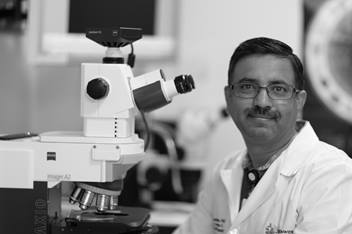Ching Lab
Urinary tract infections affect many children and adults. Along with causing immediate discomfort, they can have a significant impact on the health of one's kidneys. Current treatment and prevention centers on the use of antibiotics; however, given the rising rate of antibiotic resistance amongst bacteria, alternate means of preventing and treating infection must be found. This involves understanding why one individual may be more predisposed to infection and its sequela such as renal damage compared to another who does not get infections or does not experience such outcomes.
The Ching Lab uses a mouse model of infection to understand the host response to urinary tract infection. In addition, the lab performs in vitro simulation of infection and collects human urine samples to look for differences in components of the urine in those individuals susceptible to infection.
Lab Staff

Christina Ching, MD
Principal Investigator
Christina.Ching@NationwideChildrens.org
Christina B. Ching, MD, a pediatric urologist with a broad interest in studying the urothelial response to benign injury, specifically in urinary tract infection, is the director of Translational Research in Pediatric Urology at Nationwide Children's Hospital and a clinical assistant professor of Urology at The Ohio State University. She received her medical degree from Northwestern University Feinberg School of Medicine before completing a year of training in General Surgery and five years of training in Urology as a resident at Cleveland Clinic in Cleveland, as well as a two-year fellowship in Pediatric Urology at Monroe Carell Jr. Children's Hospital at Vanderbilt University in Nashville. Dr. Ching is trained in minimally invasive techniques of surgery as well as open.
Dr. Ching is interested in all aspects of urologic problems in children including urinary tract infections, hydronephrosis, urinary incontinence, hypospadias, kidney stones, ureteral reflux, spina bifid, and other complex pelvic and urinary conditions. She has a strong interest in translational research looking at how the bladder urothelium responds to injury and how this could be used to help better heal or even prevent bladder injury in the future. In July 2019, she received a five-year K08 award from the National Institutes of Health (NIH) to study the impact of the cytokine IL-6 signaling in host susceptibility to urinary tract infection. She still retains clinical duties and also enjoys working directly with patients.

Sudipti Gupta, PhD
Research Scientist
Sudipti.Gupta@NationwideChildrens.org
Sudipti Gupta, PhD, is a research scientist in Dr. Ching’s lab. Her current research interests include understanding the role of Interleukin-6/Stat3 signaling in the host antimicrobial response to UTI and working on the composition and method for diagnosing urinary tract obstruction to be used as biomarkers and diagnostic tools.
Dr. Gupta trained as a Microbiologist and worked on characterizing molecular interaction between HIV-1 protein nef and its human interacting partners, in Central Drug Research Institute, India, where she graduated with her doctorate degree. Dr. Gupta completed her postdoctoral training on the role of fibrates in diabetes at Youngstown State University, where she studied the kinetics of enzymes of the Polyol pathway (alternate glucose metabolism pathway responsible for secondary complication of diabetes). Her work involved generating various mutants of the enzyme and study their impact on enzyme kinetics.



